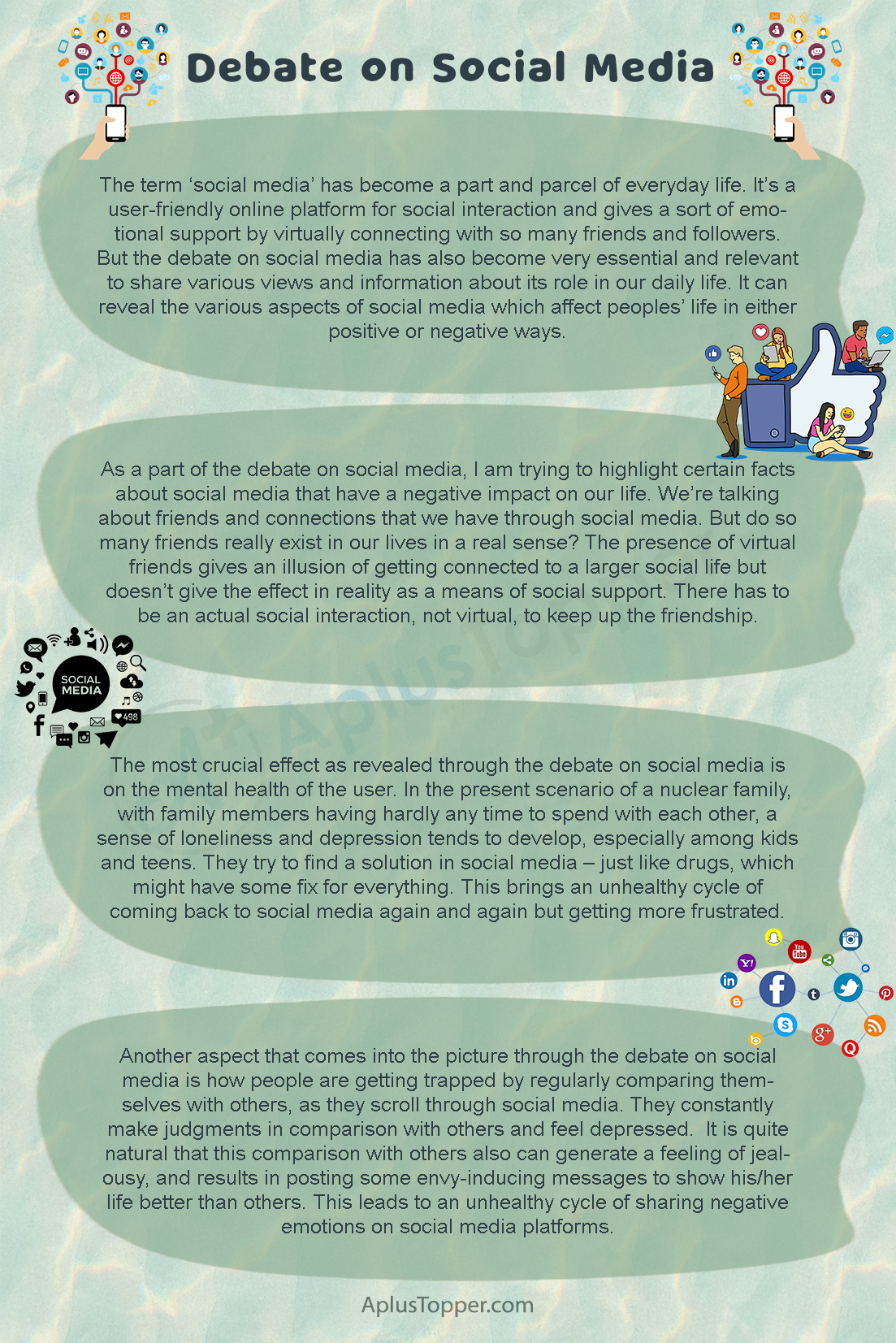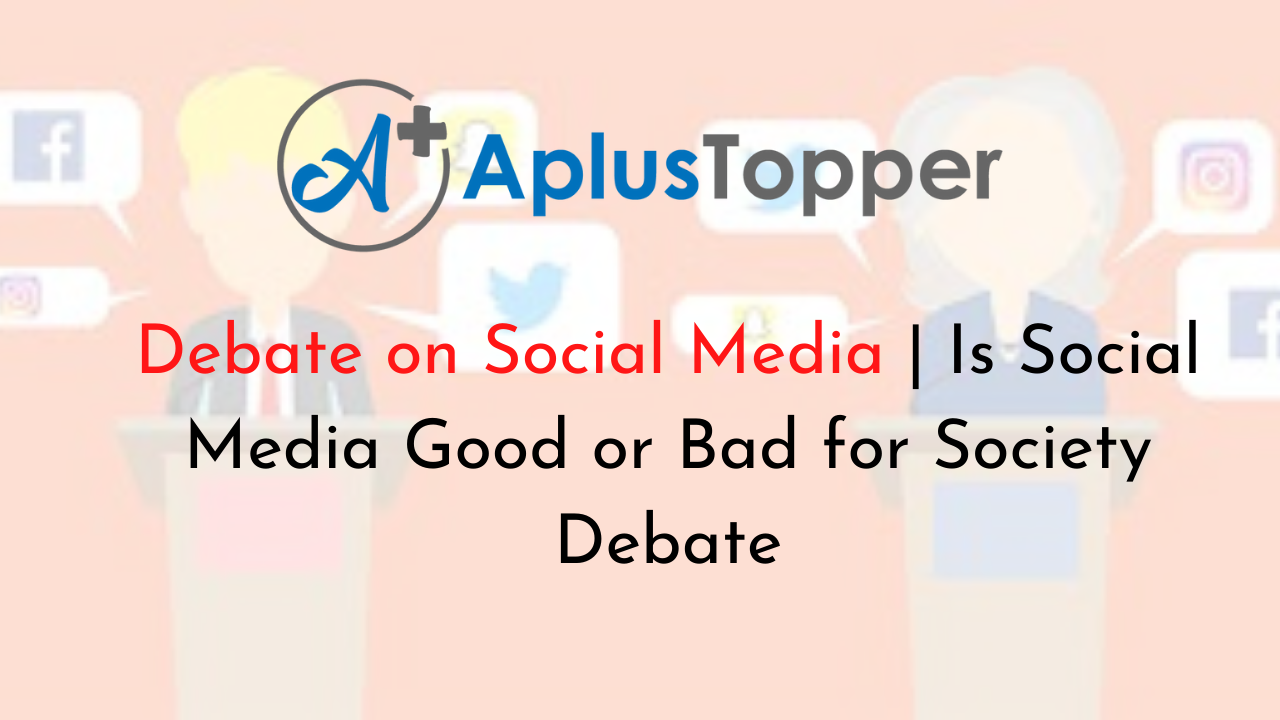Debate on Social Media: Good Morning, honorable judges, respected teachers, my worthy fellow opponents and friends.
Today, I _________ is standing here to express my views on social media. I am grateful to all who have given me the opportunity to speak in front of such an audience. I will speak in favor of the motion that ‘Social Media has a negative impact on the present generation’.
The term ‘social media’ has become a part and parcel of everyday life. It’s a user-friendly online platform for social interaction and gives a sort of emotional support by virtually connecting with so many friends and followers. But the debate on social media has also become very essential and relevant to share various views and information about its role in our daily life. It can reveal the various aspects of social media which affect peoples’ life in either positive or negative ways.
You can also find more Debate Writing articles on events, persons, sports, technology and many more.
As a part of the debate on social media, I am trying to highlight certain facts about social media that have a negative impact on our life. We’re talking about friends and connections that we have through social media. But do so many friends really exist in our lives in a real sense? The presence of virtual friends gives an illusion of getting connected to a larger social life but doesn’t give the effect in reality as a means of social support. There has to be an actual social interaction, not virtual, to keep up the friendship. The debate on social media also emphasizes the fact that spending too much on social media makes people habituated to indirect, non-verbal communication. They are losing ability and interest in direct face-to-face interaction, especially the young age groups. In fact, today’s kids and teens are growing up learning how to communicate with others by looking at the screen, not at another person’s face. This leads to a mindset resistant to wider social networking with family and relatives, which is really alarming. Online communication encourages the habit of nonverbal communication which has no involvement of facial gesture, body language and expression of emotions through vocal reactions. In this way, people are missing lots of such small real-time interactions that help a person become more mature and sensitive.
The most crucial effect as revealed through the debate on social media is on the mental health of the user. In the present scenario of a nuclear family, with family members having hardly any time to spend with each other, a sense of loneliness and depression tends to develop, especially among kids and teens. They try to find a solution in social media – just like drugs, which might have some fix for everything. This brings an unhealthy cycle of coming back to social media again and again but getting more frustrated. People feel they would feel better and satisfied after using social media, which is not the case most of the time. It’s a very similar characteristic to any other type of addiction.
Whatever be the name suggests, social media actually generates a feeling of social isolation. The presence of supportive offline social networking is one of the main sources of our well-being. But spending more time on social media keeps people away from the realities of life. This can have a very adverse effect on one’s mental health. The debate on social media also highlights the fact that people spend less time meeting in person but prefer to express their emotions in the form of emojis. This is not at all a healthy way of communicating positive or negative feelings. In-person interaction can be less smooth or predictable, but it has some positive and meaningful impacts. Personal bonding is definitely missing in social media which many people are longing for.
Another aspect that comes into the picture through the debate on social media is how people are getting trapped by regularly comparing themselves with others, as they scroll through social media. They constantly make judgments in comparison with others and feel depressed. It is quite natural that this comparison with others also can generate a feeling of jealousy, and results in posting some envy-inducing messages to show his/her life better than others. This leads to an unhealthy cycle of sharing negative emotions on social media platforms.
Following the same line on the debate on social media, we can say ‘all that glitters is not gold’-means what is shown on social media can be a fake and farce. We really don’t know whether the person who looks so great on social media is actually suffering a lot in terms of relationships or money or anything else. He/she must be desperately seeking attention and validation from others in social media.
It’s a normal human tendency to be a part of a group where people can fit in and feel well connected. The debate on social media deals with this psychological aspect very seriously. There are so many posts or groups that trigger anyone’s thought process and start influencing him. Over time, as he gets more involved in social media, his beliefs and values get similar to those shared by the group. This type of transformation can work on tender minds more effectively. The worst part is that this phenomenon closed the doors of all original thoughts and considerations. It can be even more dangerous in some cases where an extreme desire to conform to this group leads to irrational decisions and actions.
In the debate on social media, we can’t ignore the factors that affect physical health as well. According to experts, continuous sitting is as harmful as smoking. And spending time on social media makes people sit at a place for hours with a particular posture which is in no way recommended on health grounds. The more concerning thing is what we do by sitting; nothing but idle scroll up-down and swipe left-right on social media, when we can make proper use of our valuable time by spending time with family and friends, and enjoy a quality life.
The debate on social media can be an endless journey, but remember one thing; we are human and nobody is perfect. Social media brings to us only selected best parts of others lives which seem perfect (as per society standards). So just be yourself and surround yourself with positive people and there will be no stress and disappointment.

FAQ’s on Debate on Social Media
Question 1.
What can be a negative impact of social media on school students?
Answer:
Too much engagement on social media can have a negative impact on students’ concentration level, time management and verbal communication.
Question 2.
Which are the harmful communication patterns generally observed in social media?
Answer:
Cyberbullying, stalking, personal attacks and misleading information are some of the harmful communication patterns that the user found harmful.
Question 3.
What is FOMO (fear of missing out) in the context of social media?
Answer:
Fear of missing out is a state of anxiety by not having a positive experience which someone else is enjoying. This happens by comparison with others while going through social media.
